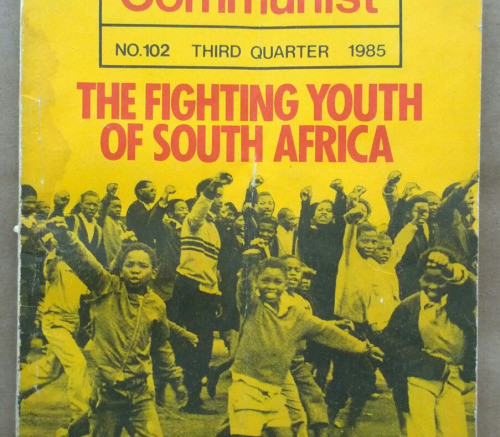Treason Trail Accused. December, 1956
In 1950 the apartheid government introduced the Unlawful Organisation bill and later changed its name and focus to the Suppression of Communism bill. The bill was introduced for many reasons but one of the main reasons was the Governments growing concern at the number communists that were infiltrating non-White political organisations e.g. Moses Kotane, JB Marks and Dan Tloome in the ANC, and Dr Dadoo, Dr GM Naiker and YA Cachalia in the South African Indian Congress. Even in the Senate, House of Assemply, and Cape Provincial Council there were communists among the representatives of the Blacks, such men as HM Basner, Fred Carneson and Sam Khan. Howerver it was in the Trade Unions, both White and non-White that communism had gained a firm hold (e.g. Solly Sachs in the Clothing Worker’s Union).
In March 1950 the Communist Party of South Africa, the African National Congress (Transvaal), the Indian Congress and the African People Organisation organised a “Freedom of Speech Convention” in Johannesburg. The Convention was called to protest the Suppression of Communism bill and a ban imposed on Dr.Dadoo and Sam Khan prohibiting them from speaking in certain cities. 500 delegates attended the Convention and 10.000 people attended the rally afterwards.
At the convention it was decided that a series of protests marches and meetings would be held across the country culminating in a national “stay at home” on the 1st May.
The ANC youth league viewed the call for the stay at home on 1st of May as undermining their own plan to for a general strike on 1st May and actively set about disrupting meetings held by the Convention organizers.
In response to the 1st May call to “Stay at Home”, the government banned all meetings and sent police reinforcements to Johannesburg. However, the protest went on and on 1 May the police attacked gatherings of protesters. For the first time since the 1921 Bulhoek Massacre the police opened fire on the protesters killing 18 and wounding 30 people …read more
The Suppression of Communism Act was still scheduled to go ahead, so on 20 June 1950, only a few days before the Suppression of Comminism Act became law, Sam Kahn announced in the House of Assembly that the CPSA had disbanded. The decision to voluntarily disband was made on 4 May by the Communists Party’s central committee, which met in Cape Town (15 votes to 2 votes). By this step the party wished to ensure that its assets would not be confiscated by the state and that Sam Kahn and Fred Carneson would retain their seats in the Assembly and Cape Provincial Council.
The government responded to this by amending the act in 1951 to people who had been communists at some previous stage in their lives. In May 1952 Kahn and Carneson were expelled from the House of Assembly and Cape Provincial Council, respectively.
In the same month The Guardian was banned. It reappeared later under names such as; The Clarion, The People’s world, Advance, The New Age and Spark, but was repeatedly banned again.
At the beginning of 1953 a national conference was convened which adopted the name South African Communist Party (SACP) to replace the CPSA. The SACP would function as an underground organisation with the purpose of ‘carrying forward and raising the banner of the Communist movement under the new and testing conditions of illegality’. It saw its task as that of combining legal mass work with the illegal work of building the Marxist-Leninist Party. Marxist- Leninism refers to a combination of Marxist ideas and Lenin’s ideas. It was the way that Lenin adapted pure Marxism to suit the situation in Russia after the Bolshevik Revolution.
The SACP worked underground and in exile in the 1950s. The party was involved in the Congress of Democrats and the drawing up of the Freedom Charter in 1955. In the infamous Treason trial that followed the Freedom Charter in 1956, 156 people were accused of ‘inciting others to overthrow the government by violent means’.
Before the prosecution case was even completed charges were withdrawn against 73 of the 156 accused, however those 73 were still quoted in the indictment as ‘co-conspirators’. Of the ninety-one accused, fifteen had been members of the South African Communist Party and thirty were Whites or Indians, but only two of the Communists and five of the Whites and Indians were included among the final thirty accused. Only a few of the Africans accused were prominent ANC leaders .


